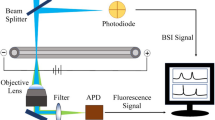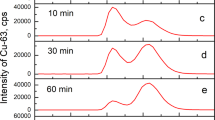Abstract
IN recent years, attention has been given to the quantitative estimation of serum fibrinolysin. Study of the plate test of Permin1 indicated that some modification of this method was necessary to estimate numerous unknown enzyme samples. The cup–plate assay method described by Dingle, Reid and Solomons2 seemed suitable, since it was designed to estimate large numbers of samples over a wide range of enzyme concentrations. We have found that a combination of the principles of these two methods is applicable to the measurement of serum fibrinolysis.
This is a preview of subscription content, access via your institution
Access options
Subscribe to this journal
Receive 51 print issues and online access
$199.00 per year
only $3.90 per issue
Buy this article
- Purchase on Springer Link
- Instant access to full article PDF
Prices may be subject to local taxes which are calculated during checkout
Similar content being viewed by others
References
Permin, P. M., Nature, 160, 571 (1947). “Fibrinolytiske Enzymer”, thesis, Copenhagen (1949); Acta Physiol. Scand., 20, 388 (1950).
Reid, W. W., Nature, 166, 569 (1950). Dingle, J. T., Reid, W. W., and Solomons, G. L., J. Sci. Food and Agric., 3, 149 (1953).
Brownlee, K. A., et al., J. Gen. Microbiol., 2, 40 (1948).
Author information
Authors and Affiliations
Rights and permissions
About this article
Cite this article
DINGLE, J., THOMAS, D. Cup–plate Assay of Serum Fibrinolysin. Nature 175, 728–729 (1955). https://doi.org/10.1038/175728b0
Issue Date:
DOI: https://doi.org/10.1038/175728b0
Comments
By submitting a comment you agree to abide by our Terms and Community Guidelines. If you find something abusive or that does not comply with our terms or guidelines please flag it as inappropriate.



